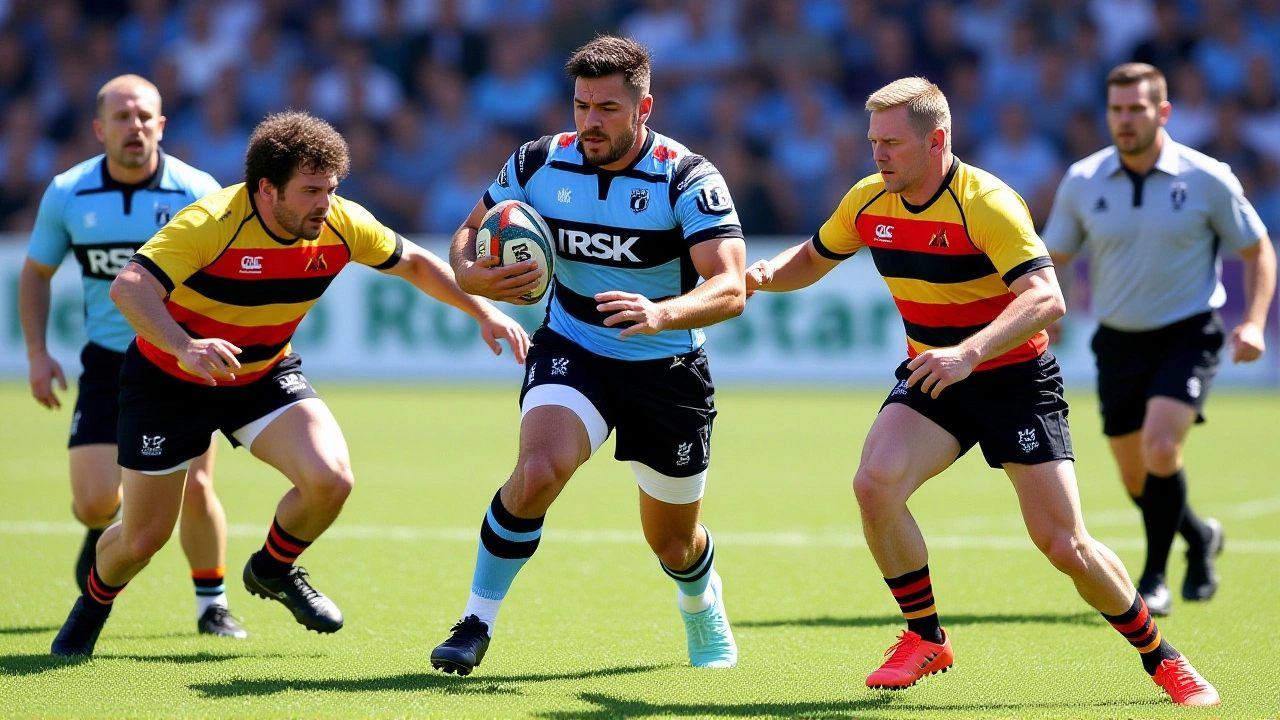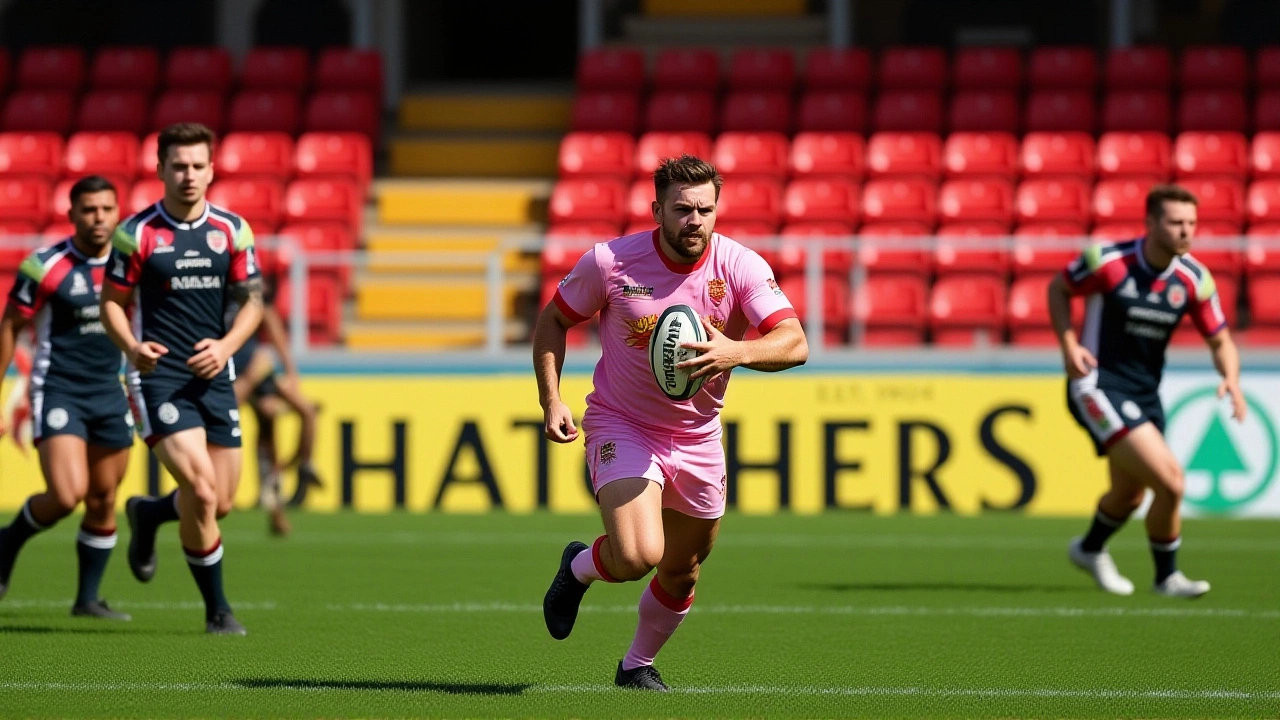 21
Nov,2025
21
Nov,2025
Cardiff Rugby didn’t just win their opening pre-season match—they sent a message. On Saturday, September 6, 2025, at Cardiff Arms Park, the Welsh powerhouse demolished Richmond FC 71-10, running in 11 tries and leaving no doubt about the gulf between United Rugby Championship pedigree and Championship newcomers. The match, played in front of a buzzing crowd as part of Cardiff’s annual Summerfest, wasn’t just a warm-up—it was a masterclass in intensity, precision, and depth.
A Team Built for Battle
Cardiff Rugby came out firing, fielding a side laced with international experience. Josh Adams, the 62-cap Wales winger whose pace still terrifies defenses, opened the scoring inside three minutes. By halftime, the scoreboard read 45-3. At the heart of it all was Taulupe Faletau, the former Wales captain and world-class number 8, whose presence alone shifted the momentum every time he touched the ball. He didn’t score, but his breakdown work and lineout leadership were the quiet engine behind the chaos.Richmond, meanwhile, were playing their second pre-season outing after a 33-14 loss to Blackheath on August 23—a game steeped in history as "Rugby’s oldest rivalry." Their head coach, Rob Powell, had named a 30-man squad blending ten summer signings with the core of last season’s National 1 title-winning side. It was a brave, almost poetic move: take your newly promoted team, fly them to Cardiff, and test them against the best Wales has to offer.
When the Gap Becomes a Chasm
The difference wasn’t just in skill—it was in rhythm. Cardiff moved the ball with fluidity, their backs threading passes like a symphony. Richmond, despite their grit, looked disjointed under pressure. When Rory Jennings darted through a gap in the 52nd minute to score Cardiff’s 10th try, the crowd erupted. The YouTube highlights video, uploaded by Cardiff Rugby’s official channel, hit 5,400 views in under two months—not because it was flashy, but because it was brutal in its clarity.For Richmond, it was about survival. They rotated 27 players across the 80 minutes, a logistical feat that speaks volumes about their depth—or lack thereof. Players like Miles Wakeling (23), Lewis Dennett (26), and Werner Nel (28) were given rare exposure to elite-level rugby. "It’s the toughest of fixtures," Powell said post-match, "but you don’t grow by playing easy games."

Why This Matters Beyond the Scoreline
This wasn’t just a pre-season romp. It was a stark reminder of the structural divide in English and Welsh rugby. Richmond, having won National 1 in 2024, are now in the Championship—the second tier. Cardiff, meanwhile, finished 9th in the URC last season, just one point ahead of Scarlets as the highest-placed Welsh side. That’s not a tier difference—it’s a league difference.Cardiff’s schedule has been brutal: after Richmond, they faced Cardiff Met, then Leinster, where they won 31-10. Their next real test? The URC opener against the Ospreys on September 20. This match against Richmond was the perfect tuning fork—loud, clear, and perfectly in tune.
For Richmond, the road ahead is longer. Their next game is against Cambridge on September 20, followed by their Championship opener against Chinnor on October 4 at the Athletic Ground in London. Tickets for the Cambridge game? £10 for non-members. Free for members. It’s a small-town feel for a team trying to survive in a big-man’s game.

Historical Echoes and Future Challenges
This was the first time Richmond had faced Cardiff’s senior side since the 1998/99 season. That’s 26 years. Back then, both clubs were in different leagues, different worlds. Now, Richmond’s promotion has forced a collision. And Cardiff didn’t flinch.What’s striking is how little media attention this match received outside Wales. No national headlines. No pundit analysis. Just a packed Arms Park, 11 tries, and a quiet but telling statement: elite rugby doesn’t wait for anyone. You either rise, or you get schooled.
Frequently Asked Questions
How did Cardiff Rugby manage to score 11 tries against a Championship side?
Cardiff’s depth and pace overwhelmed Richmond. With international stars like Josh Adams and Taulupe Faletau leading the charge, and a bench brimming with URC-caliber talent, Cardiff exploited gaps in Richmond’s defensive structure. Their backline moved with precision, while Richmond’s newer players struggled to keep up with the speed and physicality of top-tier rugby. The 11 tries weren’t flukes—they were the result of structured attack and relentless pressure.
What does this result mean for Richmond’s Championship campaign?
It’s a wake-up call. Richmond’s promotion from National 1 was impressive, but facing URC-level opposition so early reveals how much work remains. They’ll need to tighten defensively, improve their set-piece consistency, and develop leadership under pressure. Their 30-man squad rotation shows ambition, but survival in the Championship will require more than depth—it needs elite-level cohesion.
Why is this match historically significant?
It’s the first time since the 1998/99 season that Richmond’s senior side has played Cardiff’s top team. That 26-year gap reflects the growing separation between professional and semi-professional rugby in the UK. The match symbolizes the modern reality: lower-tier clubs now face elite teams in pre-season as a rite of passage, not just a favor.
How did Cardiff Rugby’s performance compare to their previous season?
Last season, Cardiff finished 9th in the URC—solid, but unspectacular. This performance suggests they’ve upgraded their attacking intent. The 11 tries against Richmond, followed by a 31-10 win over Leinster, show improved fluidity and finishing. If they maintain this rhythm, they could challenge for a top-four finish this season, something they haven’t done since 2021.
What’s next for Josh Adams and Taulupe Faletau after this match?
Both players are key to Cardiff’s URC campaign, but their roles may evolve. Adams, at 31, is still electric, and his try-scoring form could make him a World Cup contender in 2027. Faletau, 34, is transitioning into a mentor role, but his leadership and breakdown dominance remain vital. Expect both to be rested in midweek games, but fully deployed for high-stakes URC fixtures.
Can Richmond compete in the Championship after this defeat?
Absolutely—but not without major adjustments. They’ll need to develop a more physical forward pack, reduce handling errors under pressure, and build a reliable kicking game. Their next two matches—against Cambridge and Chinnor—are critical. If they can hold teams under 20 points and score at least 25, they’ll be in the playoff conversation. This loss wasn’t a death sentence—it was a syllabus.




